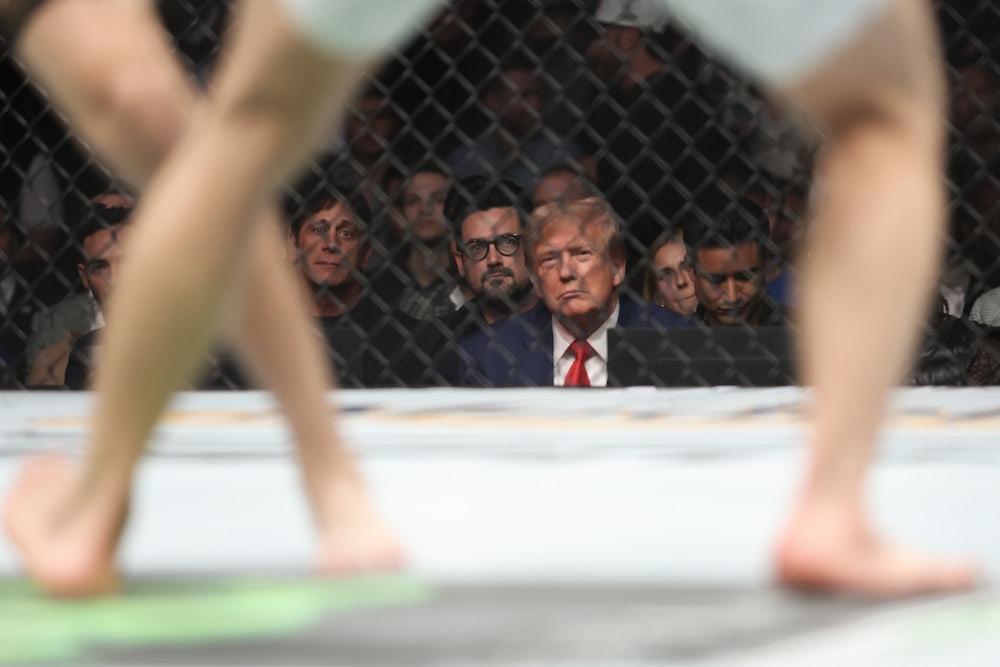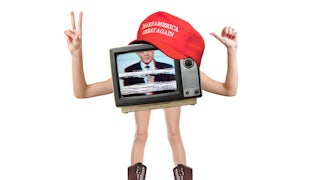In mid-December, the Ultimate Fighting Championship—by its own description the world’s “leading mixed martial arts organization”—put on one of its biggest events of the year: a matchup between welterweight champion Leon Edwards and challenger Colby Covington in Las Vegas, the fight capital of the world. But the biggest stars that night weren’t in the UFC’s trademark caged ring.
As UFC president and CEO Dana White made his entrance, the crowd erupted, less for White than for his entourage: Kid Rock and Donald Trump. With “American Bad Ass” blaring in the background, UFC commentator Jon Anik crowed about Trump’s love of the UFC. The fight itself quickly became a miniature political rally. In a ringside interview after being overwhelmed in five rounds, Covington—who rarely appears in public without a MAGA hat—heaped praise on Trump.
It was, in many ways, business as usual for the UFC, which, as it has risen to prominence over the last decade, has aligned itself with the right. But Trump’s growing commitment to the sport—on March 9, he showed up at another title fight, this time in Miami—indicates a deepening alliance: The UFC is now a crucial campaign stop for the former president as he aspires to win over young men—and to win the 2024 election.
Where some mainstream sports organizations have mildly supported liberal politics, the UFC is unabashedly right-wing. White was one of the earliest supporters of Trump’s 2016 campaign and even spoke at that year’s Republican National Convention. “A company usually doesn’t want to get into politics and back one guy or another—I’m like, let me tell you what … no matter who likes it or doesn’t like it, I care,” White said when asked about his decision to speak at the convention.
In 2023 alone, the UFC hosted Trump at three separate events, and the former president also appeared on the organization’s official podcast, UFC Unfiltered. White has appeared on Tucker Carlson’s new streaming show, The Tucker Carlson Interview, and is a vocal critic of President Joe Biden. One of Trump’s top campaign aides, Steven Cheung, previously worked as a communications director with the UFC.
The UFC’s comfortable relationship with Trump goes back decades. In 2001, when the struggling organization was being lambasted by politicians like John McCain, who had once called it “human cockfighting,” Trump hosted two fights at his Atlantic City casino.
“Affiliation with Trump has a way of infiltrating or taking over every aspect of a person’s public life if they remain loyal to him,” said Brian Hughes, co-director of the Polarization and Extremism Research and Innovation Lab, or PERIL, an American University think tank. “As we see the leadership of UFC [growing] much more comfortable expressing far-right politics, you’re going to see fighters who express even further-right politics.”
Conor McGregor, one of the UFC’s biggest stars, has been accused of helping incite anti-immigrant riots in Dublin, Ireland. In April 2023, veteran fighter Jorge Masvidal used part of his in-ring retirement speech to praise the former president. And in January, former middleweight champion Sean Strickland launched into an anti-LGBT tirade when a reporter asked him about previous comments on gay marriage.
The UFC has “become more openly conservative,” said Nate Quarry, a former UFC fighter. According to Quarry, the election of Trump was a turning point for the organization’s politics. “In the past, they were in the closet with their beliefs, and now Trump gives them the permission to be as rude and as big [of] assholes as they want.”
Presidents have long utilized sports to connect with their constituents and project working-class appeal. Richard Nixon emphasized his fandom of both football and baseball to seem like a regular guy. George W. Bush threw out the first pitch of the World Series after 9/11 to signify a return to normalcy. Sports leagues, however, have typically gone out of their way to keep partisan politics at arm’s length so as to appeal to as many people as possible. That has shifted somewhat in recent years, as many athletes—most notably former San Francisco 49ers quarterback Colin Kaepernick—have embraced activism as a means of drawing attention to racism, mass shootings, and other issues, leading to tepid actions from the leagues themselves. This, in turn, has generated a furious backlash on the right, where gestures like the END RACISM message featured in the end zone of February’s Super Bowl are treated as evidence that the NFL has gone “woke.”
Enter the UFC, which is betting that it can leverage right-wing politics to become a massive sports organization. Trump, meanwhile, has embraced it as an extension of his own brash and violent brand—and as a means of reaching young men.
“What the UFC promises is an athletic outlet and a league that the far right can claim as its own,” said Hughes.
Mixed martial arts have recently become a keystone of far-right-wing culture in America and around the globe, particularly in Europe. Active Clubs, neo-Nazi social clubs built around a shared passion for fascism and combat sports, have taken root in as many as 17 states. A brutal, individual sport that emphasizes domination, MMA is vulnerable to co-option by demagogues and right-wing influencers.
In just three decades, the UFC has become a global juggernaut, selling out London’s O2 arena, Madison Square Garden, and the Sydney SuperDome. Last year, the company merged with World Wrestling Entertainment—itself long affiliated with Trump—to become TKO Group Holdings.
Today the UFC has a near monopoly on the sport of MMA: More than 90 cents of every dollar spent globally on the sport is spent with the UFC. As much as the organization is betting on its strategic alliances with the right, it’s also betting that its market dominance means moderate or liberal viewers simply have nowhere else to turn. Unlike the NFL or NBA, which sell broadcast rights to major networks, the UFC relies almost entirely on its own production team. This complete editorial control means it can dictate the tone and style of the content produced around its roster of fighters.
“Dana White has a real stranglehold over those fighters,” Northumbria University’s Solomon Lennox, whose research is focused on the intersection of combat sports and the right wing, told The New Republic. “If I was a professional boxer, and I didn’t like the promotional company I was with … I could move to another promotional company quite easily and still get potentially the same level of fights that I could get with the other ones.
“You’re either with Dana and what Dana wants, or you’re not a part of the game.... If you don’t fit the mold and you’re not willing to toe the line, there’s no place for you in UFC, and there’s no right to respond to that. You’re just not there anymore.”
The only real threat to that stranglehold was a class-action lawsuit against the UFC, that had been set to go to federal trial in Nevada in mid-April. The suit was introduced by Quarry and a handful of other fighters a decade ago. The plaintiffs allege that the UFC uses its market dominance to squash competition and suppress the wages of its athletes. UFC fighters are paid less than 15 percent of the UFC’s total profits, whereas players in other major sporting organizations like the NFL and NBA receive closer to 50 percent. Quarry, who fought for the UFC middleweight title in 2005 and retired in 2010, made as little as $10,000 per fight during his 10-appearance career in the UFC.
“You see fighters who are begging for bonuses, fighters that have to go on GoFundMe or Kickstarter campaigns to pay for medical emergencies, hip replacements, treatments that they’ve needed from their fighting career in MMA because there’s no protection for them whatsoever,” Quarry said.
TKO Group Holdings reached an agreement to settle the lawsuit on March 13th, preventing a bruising court battle. As part of that settlement, which still requires court approval, the UFC agreed to pay the fighters in the class action a settlement of $335 million. Although ostensibly a win for the fighters on a surface level, the settlement is a huge long term victory for the UFC. Without any injunctive relief and with the settlement representing a small fraction of potential damages, the UFC’s grip on the sport of MMA is now secured, making it an even more tantalizing target for the Trump campaign. Relatively new, openly confrontational, countercultural, with a flair for theatrics, the UFC is a perfect avatar for the MAGA brand—and a means of putting Trump in front of a massive audience that is both overwhelmingly male and disproportionately Black and Latino, two demographics among which Trump has gained ground in the lead-up to the 2024 presidential election.
It’s still not clear whether Trump’s UFC gambit will pay off for him in November. Experts, meanwhile, are torn about the long-term viability of the UFC’s approach: Some argue that its willingness to embrace the right puts a ceiling on the company’s growth. Others, like Lennox, claim that, without disrupting the UFC’s death grip on the market for MMA, the sport’s rise will continue unabated—potentially putting its distinctly right-wing slant in front of millions of new fans around the globe.
“What does Dana have to lose?” Lennox said. “There’s nothing from a business sense at the moment that suggests that it’s not going to work for him.”
This article has been updated.




